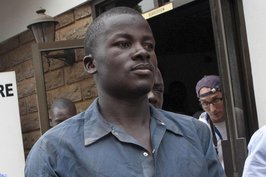Australian PM to allow vote on gay marriage
Australian Prime Minister Julia Gillard has confirmed she will allow Labor MPs a free vote on gay marriage, but it is not believed the bill will succeed.
Gillard is on the record as opposed to marriage equality and sources said this did not mean she has changed her view.
In the past, she has said Labor MPs will not be allowed a conscience vote on the issue if it is debated in parliament.
The party will debate the issue at its upcoming December conference.
Labor’s Queensland, Tasmania, West Australia, South Australia, Victoria, Australian Capital Territory and Northern Territory branches have all passed motions in support of marriage equality.
A recent poll has shown majority support among the electorate for the move to introduce gay marriage, with 80 percent of those aged 18-24 agreeing with the idea.
But commentators say any gay-marriage bill would likely fail under such a free vote. Labor controls 72 of the 150 seats in the House of Representatives, with a further 72 organized as a four-party coalition.
The coalition parties are predicted to vote solidly against a gay-marriage motion, and with Labor split on the issue, many believe a majority would be unattainable.
St. Petersburg lawmakers consider fines for ‘gay propaganda’
Legislators for the Russian city of St. Petersburg are considering new laws designed to prohibit gay “propaganda.”
The draft law introduces fines for what it terms the “propaganda of sodomy, lesbianism, bisexualism and transgenderism, to minors” and “propaganda of pedophilia.”
Fines range from a minimum of 1,000 rubles ($32) for an individual to 50,000 ($1,634) for a business.
Polina Savchenko, general manager of LGBT organization Coming Out Russia, said, “By combining homosexuality, bisexuality and transsexuality into one law with sexual crimes against minors, members of the Legislative Assembly indulge in gross manipulations of public opinion. Their goal [is] to pass an anti-democratic law, directed at severely limiting human rights in St. Petersburg. This bill is absurd, both in terms of legal logic, and in terms of plain common sense. So what is the real goal? It is clear that adoption of this law would impose significant limitations on the activities of LGBT organizations.”
Two other local legislatures introduced similar laws this year.
According to a 2005 poll, 43.5 percent of Russians supported the re-criminalization of homosexual acts between consenting adults.
In June of this year, Russian police arrested 14 gay-rights advocates in St. Petersburg. The city is Russia’s second largest, and its former capital.
Killer of Ugandan activist receives 30-year prison sentence
The killer of Ugandan gay-rights advocate David Kato, who was murdered earlier this year, has been sentenced to 30 years in prison.
The sentence was handed down to Sydney Nsubuga, also known by the name Enock, Nov. 9.
Nsubuga, 22, pleaded guilty to the Jan. 26 murder of Kato at his home in the Mukono district of Uganda.
Earlier this year, Nsubuga claimed Kato agreed to pay him for sex, but refused to hand over any money after the act. He says he did not intend to kill Kato, but was trying to defend himself.
Police arrested Nsubuga on Feb. 2, and said he had been staying at Kato’s house after he had bailed Nsubuga out of prison.
Speaking about the sentence, human-rights activist Peter Tatchell said: “It is good that justice has been done. The man jailed pleaded guilty, so we can assume that the police got the right person. It sends a signal that sometimes in Uganda, LGBT people get justice. Of course, many times they don’t. Homophobes often get away with violence. Not in this case. I hope it will encourage more LGBT Ugandans to report homophobic attacks and pursue the police until they too get justice.”
Ugandan lesbian rugby player granted asylum
The former head of Uganda’s female rugby team has been granted asylum in Germany after facing harassment.
Lilian Ikulmet, who was in charge of the She Cranes, said she had been raped, beaten and discriminated against by men for her sexuality.
Ikulmet, a professional journalist, also worked as a writer at the Daily Monitor newspaper in her native Uganda.
She said she now wants to leave the gay hostel where she is hiding at the end of the year and move into an apartment of her own.
Ikulmet also expressed a desire to apply for a visa for her girlfriend, whom she hopes to marry.
Earlier this year, Robert Segwanyi was granted leave to apply to remain in the United Kingdom as a result of his treatment in Uganda, following protracted questions over whether he was really gay.
Segwanyi said he was harassed and burnt with molten plastic while in Uganda, and feared he would be killed or jailed on his return to the African country.
The U.K. Border Authority agreed to reconsider his case at the last minute before his deportation.
Malaysian states consider new penalties for gays
Two Malaysian states are considering a change in their Islamic laws to expand punishments for gay Muslims under federal and local state laws.
New laws planned by Pahang and Malacca religious authorities would give the state governments power to punish gays in addition to national laws which provide for caning and 20 years imprisonment.
It appears prison terms could run consecutively under the laws.
Mohd Ali Rustam, chief minister of Malacca, said the state was reviewing its Islamic laws, with the effect that Muslim gays may be tried in court and punished with imprisonment or a fine.
“So many people like to promote human rights, even up to the point they want to allow lesbian activities and homosexuality,” he said. “In Islam, we cannot do all this. It is against Islamic law.”
He added that Muslim LGBT people would also be required to attend counseling and that anyone who supported homosexuality could be subject to similar penalties.
About 60 percent of the country’s population of 28 million are Muslims.
A gay arts festival was cancelled by police last week after criticism by politicians and religious leaders.
Last year, Malaysia allowed gays to appear in films for the first time, so long as they turned straight at the end.
Gay clergy may prompt Church of Scotland resignations
As many as 150 ministers in the Church of Scotland are threatening to resign over the church’s decision to allow openly gay clergy.
The church’s general assembly, its governing body, opened the way to ordination of gay clergy in May, lifting a moratorium on appointment of gay and lesbian clergy that had been imposed after a gay man, Scott Rennie, became a minister in 2009. There will not be full inclusion of gay clergy until at least 2013, following completion of a study by church leaders.
Still, senior sources estimate as many as 150 serving ministers are considering resignation, in the largest schism in the church since 474 ministers quit in 1843 to form the Free Church of Scotland. The dissatisfied clergy may form another breakaway denomination, some observers said, but a spokesperson for the church contended the objections to gay clergy are not so widespread.
— compiled by Larry Nichols

